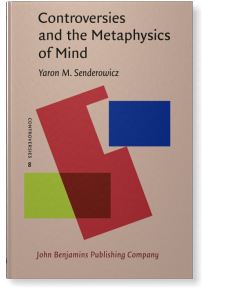Controversies and the Metaphysics of Mind
Since ancient times, metaphysical theories have been shaped by the dialectical relations between metaphysical positions. The present book offers a new account of the role of controversies in the evolution of ideas in current metaphysics of mind. Part One develops a pragmatic theory of metaphysical controversies that combines Kantian themes and themes from current argumentation theory. The theory developed in this book underscores the role of a unique type of dialectical arguments which establish metaphysical positions as controversial relevant alternatives in the evolution of chains of debates in metaphysics. In Part Two and Part Three, this theory is applied to chains of debates in present day metaphysics of mind which address the problems of consciousness and personal identity. One of the contentions defended in this book is that the intellectual history of metaphysics is not a process in which positions are replaced by opposite positions, but rather, a history of their status as relevant alternatives. The book analyzes in detail and demonstrates how progress in contemporary metaphysics of mind consists in a dialectical process through which challenges to extant positions lead to innovative alternatives that are intrinsically relevant to advancing the understanding of the issues under discussion.
[Controversies, 8] 2010. xi, 235 pp.
Publishing status: Available
© John Benjamins Publishing Company
Table of Contents
-
Acknowledgments
-
Introduction
-
Part one. Outline of a theory of metaphysical controversies
-
Chapter 1. The Kantian framework | pp. 17–34
-
Chapter 2. The idea of controversy and metaphysics | pp. 35–58
-
Chapter 3. Intuitions, thought experiments, and controversies | pp. 59–78
-
Part two. The knowledge argument
-
Chapter 4. The polemical character of the knowledge arguments | pp. 81–96
-
Chapter 5. The antinomies of consciousness and their resolutions: Phenomenal concepts, representationalism, and two-dimensional semantics | pp. 97–124
-
Chapter 6. A priori knowledge and the explanatory gap | pp. 125–158
-
Part three. Personal identity and revisionary metaphysics
-
Chapter 7. Personal identity, self-consciousness, and bodily identity | pp. 161–180
-
Chapter 8. From transcendental arguments to revisionary metaphysics | pp. 181–196
-
Chapter 9. Neo-Lockeanism, reductionism, and animalism: The emergence of a new debate | pp. 197–220
-
Conclusion | pp. 221–224
-
-
Index | pp. 233–236
“This book [...] is of great interest for people involved in linguistic subfields such as pragmatics and discourse analysis, as it illustrates the vitality of argumentation theory and makes the case for more interdisciplinary work between philosophers, discourse and argumentation analysts and linguists. [...] it is orginal and promising enough to be recommended as a very stimulating lecture and as a valuable attempt to bridge the gaps between several subfields and disciplines concerned with rational discourse.”
Pierre-Yves Modicom, Université Paris IV
“[...] it is nevertheless original and promising enough to be recommended as a very stimulating lecture and as a valuable attempt to bridge the gaps between several subfield and disciplines concerned with rational discourse.”
Pierre-Yves Modicom, on Linguist List 22.500
Cited by (4)
Cited by four other publications
Soboleva, Anita
Senderowicz, Yaron M.
2020. Chapter 9. Husserl’s phenomenology of inner time-consciousness and enactivism. In Controversies and Interdisciplinarity [Controversies, 16], ► pp. 177 ff. 
Fritz, Gerd
2018. Chapter 1. The pragmatic organization of controversies. In Historical Pragmatics of Controversies [Controversies, 14], ► pp. 1 ff. 
This list is based on CrossRef data as of 18 july 2024. Please note that it may not be complete. Sources presented here have been supplied by the respective publishers. Any errors therein should be reported to them.
Subjects
Main BIC Subject
HPJ: Philosophy: metaphysics & ontology
Main BISAC Subject
PHI004000: PHILOSOPHY / Epistemology
